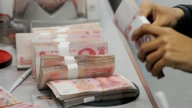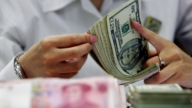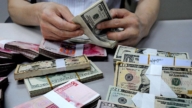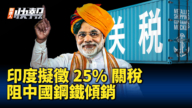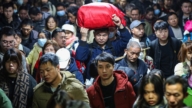【新唐人2014年06月04日讯】5月是中国楼市销售的传统旺季,在业内素有“红五月”之称。不过今年5月的“百城价格指数”显示,中国一百座城市的房价,两年来首次出现环比下跌,超过六成的城市房价下跌。而一线城市的北京楼市,也在量价齐跌中“收官”。人们担忧的中国房地产“拐点”真的来了吗?请看以下报导。
“中国指数研究院”5月31号发布的“百城价格指数”显示,今年5月份全中国100个城市的住宅,平均价格为每平米10978元,环比下跌了0.32%,这是自2012年6月以来,连续环比上涨23个月后,首次开始下跌。
从涨跌城市数量来看,62个城市环比下跌,比4月份增加了17个,其中跌幅在1%以上的有30个,比上月也增加了14个。
北京、上海等十大城市的住宅均价为每平米19605元,环比下跌0.18%,8大城市环比下跌。
《新唐人》特约经济评论员马杰森表示,中国楼市现在改变了过去十几年连续上涨的趋势,大家的共识是:“房价必然会下行。”
《新唐人》特约经济评论员马杰森:“在价格上、销量上各方面迹象都显示出,实际上出现拐点了。就是它从增长很可能变成不涨,有些地区甚至会出现下跌,个别地区已经出现了暴跌。”
马杰森表示,中国房地产的泡沫也不平均,像北京、上海这样的一线城市,楼市需求量大,价格下跌不会那么太快;但是三线、四线城市,就会出现悬崖式的下跌。
据《中原地产》监测,中国有21个大中城市,近一个月的新开楼盘认购率,都在45%以下,而去年的新开楼盘认购率为56%﹔截至5月中旬,中国20大标竿房企销售额为2414亿元,仅是去年全年销售额的28.3%。
而作为房地产市场龙头的北京也不乐观:5月份北京楼市新建商品房环比4月销售,减少了12.4%,如果剔除保障房,则比去年同期下降了23.5%。北京的二手房销售环比则下降了9.02%,并创下了自2009年以来交易量的新低,价格环比也下跌5.55%。
不过,更令人担心的是,截至5月底,北京商品房的库存量达到了77058套,近3个月就增加了22000套。
鉴于房地产现状,在过去两个多月,中共陆续出台宏观政策,不仅加大“微刺激”力度,还进一步放开,采取了包括“沪港通”试点方案、出台10个省市地方政府债券自发自还的试点方法﹔以及鼓励社会资本参与基础设施投资等一系列措施。
北京《国情内参》首席研究员巩胜利:“这轮调整可能是中国经济36年改革开放以来最麻烦的一次,一个是它的货币供应量最大了;还有一个是美国的QE,10月份要结束了,国际上的货币开始收缩了;还有一个是中国经济的速度开始下降了。”
北京《国情内参》首席研究员巩胜利指出,过去胡、温当政的10年中,中国的经济从数据上增长了230多倍,但它里面有太多的泡沫和水分,所以,中国的经济品质在G20国家中是最差的。所以,调整势在必行,这也是中共历史上一个最大的挑战。
公开资料显示,去年中国经济增长7.7%,但房地产投资就占到了GDP的15%以上。房地产也在去年对中国经济的贡献超过了20%,土地收入占到了地方财政70%的份额。另外,房地产行业去年融资高达12万2000亿人民币,也占全国融资额的70%以上。
巩胜利认为,今年中国房地产至少下滑20%。
巩胜利指出,如果今年房地产下滑超过30%,中国就会爆发经济危机,因为房地产耗费和占用了中国太多的货币和资本。中国一旦爆发经济危机,还会冲击到其他国家。
5月15号,“中国农业银行”首席经济学家向松祚在“2014中国金融论坛”上警告说,中国发生系统性、全域性金融危机的可能性已经超过60%,甚至可能超过70%!
采访/陈汉 编辑/宋风 后制/葛雷
Turning Point? Housing Prices in a Hundred Cities
Dropped in May
May is the traditional peak season of China’s property market,
referred to as “Red May” in the sector.
But the “100 Cities Price Index” shows that housing prices in
one hundred cities dropped for the first time in two years in
May 2014, with price drops in over 60% of the cities.
Beijing’s property market also dropped in volume and price.
Has the feared China Real Estate bubble bursting point arrived?
The 100 Cities Price Index by China Index Research Institute
released on May 31 shows that the average price of residential
estate across 100 cities in China was 10,978 yuan per square
meter, down by 0.32% month on month, andyear on year.
This is the first drop after a 23-month continuous increase
from June 2012.
Housing prices of 62 cities dropped, an increase of 17 cities
since April 2014.
Housing prices of 30 cities dropped over 1%,
an increase of 14 cities compared with last month.
In ten large cities such as Beijing and Shanghai, average
residential housing prices, were 19,605 yuan per square
meter, down 0.18%.
House prices of eight major cities fell.
NTD special economic commentator Jiesen Ma said China’s
property market trend has changed from continuous increase
in the past decade.
The consensus is that prices will inevitably fall.
Jiesen Ma: “Signs of price, sales and all aspects
show that the turning point has arrived.
The growth is likely to stop. Prices will fall in some areas.
In fact, prices in certain areas already plummeted sharply.”
Jiesen Ma said that China’s real estate bubble is not even.
Top-tier cities such as Beijing and Shanghai have large
demand, so prices will not drop as fast.
However third and fourth-tier cities will
experience sharp decreases.
According to Central China Real Estate, The new real estate
subscription rates in China’s 21 large and medium level cities
were all below 45% in May, compared to 56% in 2013.
From mid-May, sales of China’s top 20 real estate firms
was 241.4 billion yuan, only 28.3 % of 2013 yearly sales.
The situation of market leaders in Beijing is not optimistic:
May’s new housing sales were 12.4% less than in April,
and a 23.5% decrease from last year if ignoring numbers
for indemnification apartments.
Sales of Beijing’s second-hand housing stock declined
9.02% from April and and hit a new low since 2009.
Prices fell by 5.55% compared to April.
More concerning is that the inventory of commercial housing
reached 77,058 units at the end of May, an increase of nearly
22,000 units in three months.
Facing these issues, the Chinese Communists Party (CCP)
rolled out macroeconomic policies in the past two months.
It tries to strengthen the scale of “micro-stimulus,” and further
opening up, including the trial policies like “Shanghai-Hong
Kong Connect.”
It also introduced the pilot program to allow ten local
governments to issue bonds, encouraging capital invested
in infrastructure.
Beijing’s Internal Situation Reference lead researcher
Gong Shengli: “This round of adjustments may be most
difficult in China’s 36 year economic reform of opening up.
It put in the largest amount of money supply.The U.S.
Quantative easing will end in October, so the international
monetary system will contract.
Another factor is that China’s economy is starting to slow.”
Gong Shengli pointed out, in Hu and Wen’s 10-year regime,
China’s economy index grew 230 times.
But it contained too many bubbles.
China’s economy quality is the worst among
the G20 countries.
So, the adjustment is imperative.This is also the biggest
challenge in the CCP’s history.
Public data shows China’s economy growth was 7.7%
last year.
The real estate investment accounted for over 15% of GDP.
Real estate contributed to 20% of China’s economy last year.
Land revenue accounted for 70% of local finance.
The real estate industry finance also reached 12,200 billion
yuan in 2013, over 70% of the country’s finance.
Gong Shengli believes that China’s real estate market
will fall by at least 20% in 2014.
Gong Shengli pointed out that if real estate falls over 30%
this year, China will have an economic crisis.
Real estate takes too much money and capital. The economic
crisis in China will also impact other countries.
On May 15, Bank of Agriculture chief economist
Songzuo Xiang warned during the 2014 China Financial
Forum that possibility of systemic and global financial
crisis in China is over 60%, or even more than 70% !
Interview/ChenHan Edit/SongFeng Post-Production/GeLei


